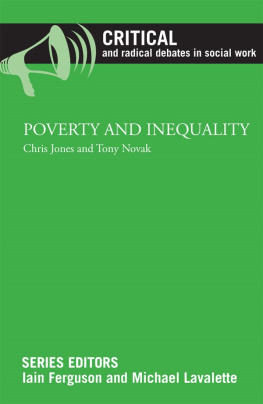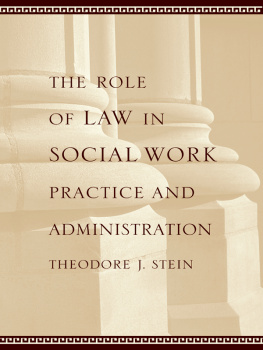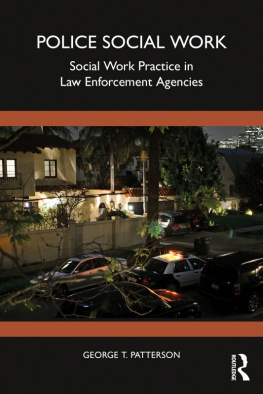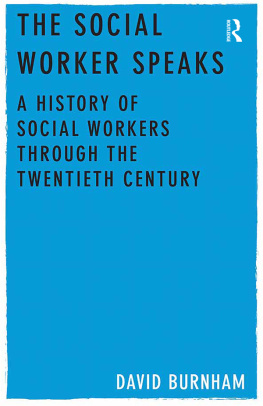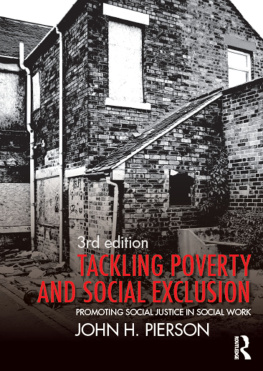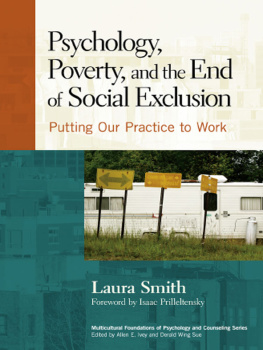SOCIAL WORK AND POVERTY
TO MY PARENTS AUDREY AND EDWARD DOWLING
AND MY GRANDMOTHER HILDA JACKAMAN
Social Work and Poverty
Attitudes and actions
MONICA DOWLING
Royal Holloway, University of London
First published 1999 by Ashgate Publishing
Reissued 2018 by Routledge
2 Park Square, Milton Park, Abingdon, Oxon, 0X14 4RN
711 Third Avenue, New York, NY 10017, USA
Routledge is an imprint of the Taylor & Francis Group, an informa business
Copyright M. Dowling 1999
All rights reserved. No part of this book may be reprinted or reproduced or utilised in any form or by any electronic, mechanical, or other means, now known or hereafter invented, including photocopying and recording, or in any information storage or retrieval system, without permission in writing from the publishers.
Notice:
Product or corporate names may be trademarks or registered trademarks, and are used only for identification and explanation without intent to infringe.
Publisher's Note
The publisher has gone to great lengths to ensure the quality of this reprint but points out that some imperfections in the original copies may be apparent.
Disclaimer
The publisher has made every effort to trace copyright holders and welcomes correspondence from those they have been unable to contact.
A Library of Congress record exists under LC control number: 99072361
ISBN 13: 978-1-138-34570-6 (hbk)
ISBN 13: 978-1-138-34572-0 (pbk)
ISBN 13: 978-0-429-43772-4 (ebk)
Firstly thanks to all the social service users, social workers, students, and social services staff who have participated in the research. Without their support and cooperation in dealing with difficult and sometimes emotional issues, this book would not have been possible.
Secondly thanks to all my colleagues at the University of Sheffield and RHBNC, University of London for their help and advice. Jan Morgan and Sheila Sweet at Royal Holloway did a great job on type setting the book for the publishers.
Finally thanks to family, friends and my husband Martin Rudd for support and care during the times of exhilaration, trauma and stress that completing this work has involved.
In 1975 I was asked by someone not connected with social work whether I thought the families with financial difficulties I was visiting for the Housing Department were different from other families. Had they not got these enormous debts because they were lazy, bad, or more stupid than other people? I could honestly answer that from my observations I did not see them as different from other families I knew. I was surprised because I had not up to then linked the social work placement I was undertaking to peoples' attitudes to 'deserving' and 'undeserving' poor, despite this being the fourth year of my social work course. The theory and practice of social work were not integrated.
The aim of this book is to investigate: social workers' attitudes and actions towards poverty issues; social service users who have needed financial help - their attitudes to social workers; and to question whether learning about poverty is an integrated part of social work students' training and social workers' in-service training.
The research is influenced not only by my own experiences of being a social work student and social worker, but also by being a social work teacher and researcher and an unemployed income support claimant in between periods of teaching and while looking for a job after periods of studying.
Being unemployed and living on benefits is an experience that has become common for undergraduate and postgraduate students if only on a temporary basis. It is common for longer periods of time for greater sections of the population in the 1980s and 90s than was the case in the 1950s, 60s or 70s. The experience is not one most people would wish to continue. However many individuals who go to social services for financial help have children or are disabled which often makes their situation far more difficult to escape. Any comparison between groups of poor claimants is difficult to maintain - however the experience of receiving money from the State and thus being part of a 'dependant' population, is understood by all who have had to live on State benefits for however short a time, and many who have not.
The relationship between social work and poverty is close and long-standing: as long as there has been a profession of social work the vast majority of its clients have been poor and experiencing different forms of social exclusion. In this important book Monica Dowling subjects this relationship to a welcome new perspective which explores the subjective interaction between social workers and the poor and which traces the ways in which workers' attitudes and actions are influenced by their training, personal backgrounds and the wider/political economy. Monica Dowling's book is not an arid or abstract investigation, but one which is informed throughout by well researched insights into the attitudes and experiences of social service users, social workers and social work students. She presents a powerful case for the compulsory use of poverty awareness training which is as important in social work as disability, gender, race and age awareness.
This book represents a challenge to social workers to confront the material deprivation of social service users, social work educators to improve teaching about poverty and social exclusion and policy makers to abolish poverty and social exclusion.
Alan Walker
University of Sheffield
This study has investigated to what extent social workers' attitudes to poverty have been translated into actions. It includes a consideration of the ways in which social workers aid social service users with financial difficulties - through welfare rights advice and/or advocacy or direct cash payments. Social workers are increasingly being expected to collude with the DSS's' functions of income maintenance and therefore their role as welfare rights advocates/advisers has been compromised. However social service users' increasing poverty indicates that social work help with financial and material needs may be an important part of the social work task from a consumer' perspective, both in training and in work.
Social work students had more positive attitudes than social workers towards dealing with poverty in practice, and were critical of the social control functions of social workers in relation to income maintenance. However, they were not similarly subject to the controls and norms of social work institutions. The poverty awareness programme, created as a result of the fieldwork findings, allows social workers and social work students to become more aware of conflicts between attitudes and actions, and fulfils students' needs for an understanding of poverty that integrates theory and practice.
Some social service users constructed their financial problems differently from the way social workers perceived them. However users were generally grateful for any financial help or advice they received, but tended to find such help stigmatising. Some users had turned to welfare rights agencies for further financial advice where such agencies were available.


